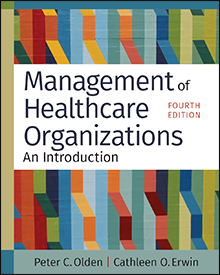Contents
Management of Healthcare Organizations: An Introduction, Fourth Edition
Peter C. Olden, PhD, LFACHE Cathleen O. Erwin, PhD
Softbound,
450pp,
2023
- Digital Access: $48.00 180-Day Access on ACHE Activate
- Print: $105.00
By Topic:
By Collection:
- Digital Publication
- Textbooks
Book Description
Instructor Resources: Test bank, PowerPoint slides, suggested answers to discussion questions, and a transition guide to the new edition.
To become a successful healthcare manager, students need to understand management theories and methods and know how to apply them to real-world problems. Management of Healthcare Organizations: An Introduction teaches this in an engaging way. The authors provide aspiring managers with theoretical background, practical methods, and hands-on exercises to prepare for careers in healthcare management, emphasizing the multifaceted nature of management problems and the need to combine a variety of approaches to solve them.
This straightforward text includes bulleted lists, examples, activities, exhibits, and exercises to boost readability, retention, and engagement. Chapters are arranged to sequentially build a body of knowledge and a mental framework for management. Each chapter begins with a scenario taken from the same complex telehealth case study, reinforcing the complexity of management problems while introducing chapter concepts. This book is applicable to a wide range of healthcare organizations and combines time-tested fundamental principles with cutting-edge methods and current knowledge.
Each chapter in this new edition has updated information on diversity, equity, and inclusion, and strategies for managing clinical staff and performance, as well as “Try It, Apply It” real-world exercises. The book includes new and expanded content on topics such as:
- Key theories of management
- Project performance domains and principles
- The five categories of strategy
- Medical staff responsibilities, structure, and bylaws
- Creation of effective virtual teams
- Artificial intelligence in healthcare organizations
- Employee engagement
- Orientation of remote workers
- Motivating a diverse workforce
- Plan-do-study-act (PDSA) cycle, Lean, and Six Sigma
- COVID-19 response and impacts
- Burnout and psychological safety
By studying Management of Healthcare Organizations: An Introduction, students will acquire the knowledge and skills necessary to analyze managerial problems and develop practical solutions in health care organizations.

